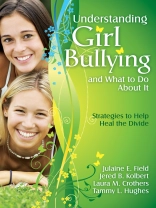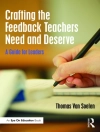‘A useful tool for school counselors that outlines the root causes of girl bullying. It provides examples of ways to assess relational aggression in schools, as well as possible interventions.’
—Jennifer Betters, School Counselor
Sugar Creek Elementary School, Verona, WI
‘This is a well-researched book that integrates theory and research with applications.’
—Carol Dahir, Associate Professor of Counselor Education
New York Institute of Technology
Break the cycle of social and relational aggression between girls!
Girl bullying—also known as relational aggression—is a very real and pervasive problem in today′s schools, and studies indicate that bullying between girls can be more covert than between boys, thus making it more difficult for school professionals to detect and address.
Primarily written for school counselors, this book covers the causes and characteristics of relational and social aggression and outlines methods for assessment, prevention, and intervention. The authors answer questions about what girl bullying is, why it happens, what it looks like, how to measure it, and what educators can do to help girls with these issues. The book provides:
- School-based interventions to help students learn alternative, healthy ways of managing conflict
- Sample forms and checklists for documenting and addressing incidents of girl bullying
- An original 10-session curriculum for small groups
- Information on classroom dynamics, bullying, and cyberbullying
- Specific suggestions for working with parents and teachers
Understanding Girl Bullying and What to Do About It helps professionals heal the divide between girls by giving them the tools to work through their problems thoughtfully and constructively.
Jadual kandungan
List of Tables and Figures
Acknowledgments
About the Authors
Introduction
1. Understanding Relational and Social Aggression
Definitions of Relational and Social Aggression
Cyberbullying
Why Use Relational and Social Aggression?
Evolutionary Psychology
Systemic (Social and Cultural) Influences
Social Learning Theory
Developmental Perspective
What Does It Feel Like to Be in a Relationally and Socially Aggressive Climate?
Rules of Engagement
Conclusion
2. Measuring Relational and Social Aggression
Sociometric Procedures
Questionnaires and Surveys
Teacher Rating Scales and Reports
Parent Reports
Student Self-Reports
Interview Strategies
Focus Groups
Observations
Ethical Considerations in Assessment
Conclusion
3. School-Based Interventions
Factors in Selecting Interventions
Primary Prevention Programs: Support for Child Development
Secondary Intervention Programs: Schoolwide Support
Tertiary Prevention Programs: Targeted Interventions for Students
Conclusion
4. Strategies for Working With Parents and Teachers
Working With Parents of Relationally Aggressive Girls
Using Enactments With Parents of Relationally Aggressive Girls
Working with Parents of Relationally Victimized Girls
Using Enactments with Parents of Relationally Victimized Girls
Consulting With Teachers
Consulting With Teachers in Working With Girls Who Use Relational Aggression
Consulting With Teachers in Helping Relationally Victimized Girls
Conclusion
5. Goodwill Girls: A Small-Group Curriculum
Using Group Counseling With Victims and Perpetrators
The Goodwill Girls Small-Group Curriculum
Conclusion
Appendix: Handouts for Goodwill Girls Small-Group Curriculum
References
Index
Mengenai Pengarang
Tammy L. Hughes is an associate professor at Duquesne University and president of the Division of School Psychology of the American Psychological Association (APA). She is also the co-chair of the School Psychology Leadership Roundtable (SPLR) and is a past-president of Trainers of School Psychologists (TSP). Hughes is an associate editor for Psychology in the Schools and serves on the editorial boards of School Psychology Quarterly and International Journal of Offender Therapy and Comparative Criminology. She is the author and coauthor of numerous books, journal articles, chapters, and other publications on child violence, differentiating emotional disturbance and social maladjustment, and understanding the relationship between emotional dysregulation and conduct problems in children. She routinely provides scholarly presentations at national and international conferences and professional sessions for local and state constituents. Her work experience includes assessment, counseling, and consultation services in forensic and juvenile justice settings focusing on parent-school-interagency treatment planning and integrity monitoring.Contact Information:Email: [email protected]












